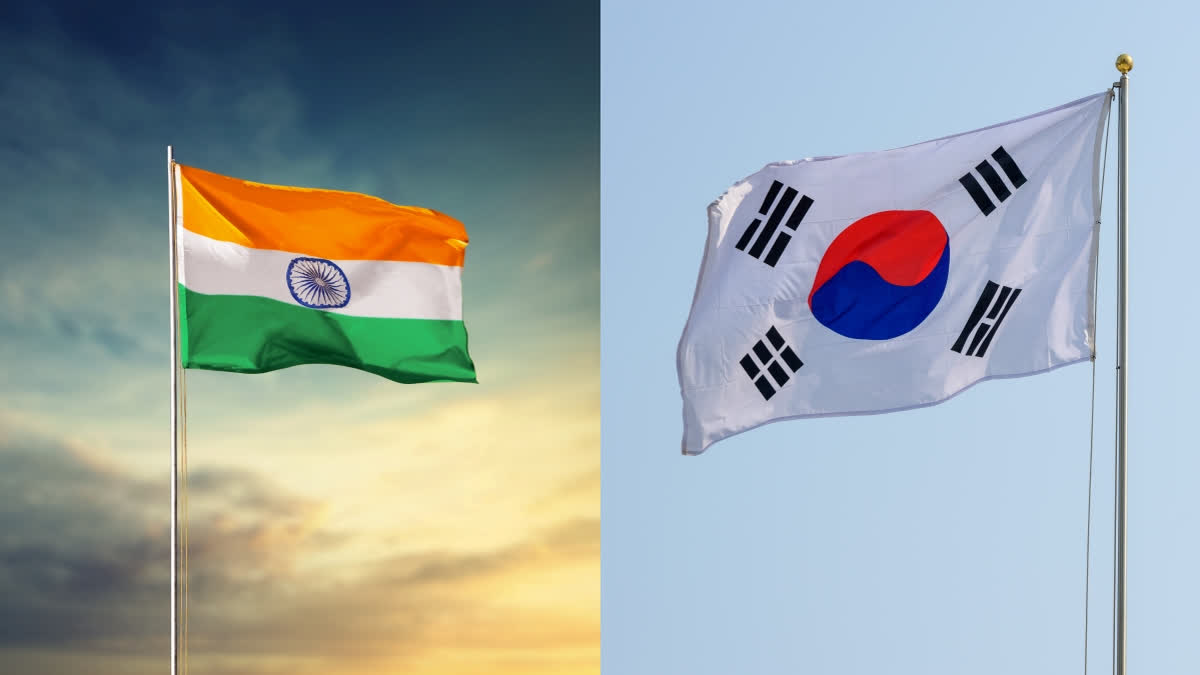New Delhi: During the course of his visit to South Korea on March 5-6, External Affairs Minister S Jaishankar delivered a speech at the Korean National Diplomatic Academy on the theme "Broadening horizons: India and Korea in the Indo-Pacific" in which he explained how India and the East Asian nation can work together for the peace and prosperity in the Indo-Pacific region and beyond by building supply chain resilience, leveraging complementary technology strengths, and linking geographies through connectivity.
"The Indo-Pacific emerged as a consequence of geo-political shifts in the last few decades," Jaishankar said. "Till then, American strategic dominance kept the Pacific separated from the Indian Ocean as a theatre. This was meant to assert a certain primacy of interest in the former. Where the Indian Ocean itself was concerned, the focus was much more centred around the Gulf. However, as challenges changed and capabilities were stretched, a more cohesive effort was needed not only in respect of its own resources but working with more partners as well. This period has therefore not only seen a revision in strategic concepts but also a more open approach to global collaboration."
Explaining that the perspective of India in terms of the Indo-Pacific region is somewhat different, he said that New Delhi's interests were steadily extended as part of the Look East and then Act East policies. India's stakes, he said, in terms of trade, investment, services, resources, logistics and technology in the Indo-Pacific are growing by the day.
"Ensuring the stability, safety and security of this region is therefore vital for us. We have an obligation to the global commons, just as we have a duty to do global good," Jaishankar said.
In this connection, he emphasised on the importance of South Korea's releasing of an Indo-Pacific Strategy in 2022. "My understanding is that it (South Korea’s Indo-Pacific Strategy) envisages a free, peaceful and prosperous region based on three principles of inclusiveness, trust and reciprocity," Jaishankar said. "This certainly creates the basis for working more closely with like-minded partners."
India, it may be mentioned here, is part of the Quad, also comprising the US, Japan and Australia that is working for a free and open Indo-Pacific in the face of China’s hegemony in the region that stretches from the east coast of Japan to the east coast of Africa.
While being members of the Quad, India and Japan also established the Act East Forum, which aimed at providing a platform for India-Japan collaboration under the rubric of New Delhi's Act East Policy and Tokyo's Vision of a Free and Open Indo-Pacific.
It is in light of this that Jaishankar's specific reference to South Korea's Indo-Pacific Strategy throws up the importance of forging an India-South Korea-Japan trilateral alliance, an idea that was seeded during the visit of then Prime Minister Manmohan Singh to Seoul in 2012.
A joint statement issued following a meeting between Singh and then South Korean President Lee Myung-bak had stated: "The two leaders welcomed the commencement of a trilateral India-ROK (Republic of Korea or South Korea)-Japan dialogue amongst think-tanks of the three countries, the first of which will be held in Delhi in 2012."
Following this, the First Track II Dialogue among India, Japan and South Korea was held in New Delhi in June 2012. Addressing the Dialogue, Sanjay Singh, then Secretary (East) in the Ministry of External Affairs said: "We seek a peaceful and secure Asia free from the threats of terrorism, proliferation, piracy and conflicts between states. There is a common commitment to maintaining freedom of the seas, combating terrorism and promoting inclusive economic growth. India, Japan and ROK depend heavily on the Sea Lanes of Communications (SLOCs) for their energy security."
He also added that he expected the trilateral to "generate ideas that would influence the wider relationship existing amongst the partners at governmental level and at the people-to-people level and develop a shared understanding on how we view our region and the emerging Asian architecture".
What he did not directly mention was the growing belligerence of China in the region. However, for one reason or another, the proposed trilateral alliance between India, South Korea and Japan could not fructify.
Now though, with South Korea releasing its own Indo-Pacific Strategy, prospects of the revival of such an alliance have emerged. South Korea's new Indo-Pacific strategy, unveiled in December 2022, aligns with the strategies of the Quad comprising India, the US, Japan and Australia.
In its new strategy, South Korea pledged to bolster the regional rules-based order to protect freedom, democracy, and human rights. The document expands on President Yoon Suk Yul's previous promises to accept greater responsibility for defending democratic principles and is consistent with the national security strategies of the US and its allies. However, it held back from unambiguously defining the Chinese threat in the region to the same extent that India, the US, Japan, and Australia have.
According to observers, though South Korea definitely worries about what China is doing in the Indo-Pacific, it stayed in the background as it did not want to be seen as countering China. Seoul basically wanted its role to be seen in the economic areas rather than to be seen as being in the camp of the US.
Despite being a formal ally of the US under the 1953 Mutual Defence Treaty, South Korea has deep-rooted economic linkages with China, which is its largest trading partner with a Free Trade Agreement (FTA) in place since 2015. South Korea also saw China as an important player in the ties with North Korea. These factors had compelled former South Korean President Moon Jae-in to avoid antagonising China and accommodate its rise through a cautious posture of strategic ambiguity.
However, with Yoon becoming the President of South Korea and releasing his country's Indo-Pacific Strategy, things are now changing. In fact, in August last year, South Korea, Japan and the US held their first trilateral summit at Camp David in the US. Ahead of the summit, Yoon said in a televised speech that the meeting between the leaders of the three countries "will set a new milestone in trilateral cooperation contributing to peace and prosperity on the Korean Peninsula and in the Indo-Pacific region".
It is in this context that an India-South Korea-Japan trilateral alliance for a secure and stable Indo-Pacific region should be seen.
According to Tunchinmang Langel, a Research Fellow at the Indian Council of World Affairs think tank and who is working on the geopolitics in the Indo-Pacific, India, Japan and South Korea are now needed at the forefront of economic, political, and defence engagements as the centre of gravity rapidly shifts towards the Indo-Pacific.
The rise of their economic prosperity and an even higher level of economic integration in the region have also increased their vulnerability to external shocks. The state of flux entails that the three countries cooperate in maintaining the rule of law and order to ensure peace and stability, a goal that will become increasingly complex owing to global uncertainties. And Yoon becoming President of South Korea can just help in that.
"Under President Yoon, there is a distinctive departure from his predecessor who was mostly focused on inter-Korean cooperation," Langel told ETV Bharat.
"It is a return to conservative leadership and a return to the restoration of the US-South Korea alliance that had languished due to emphasis upon courting North Korea during the predecessor's term," he said.
"President Yoon's government is more focused on creating a 'Global Pivotal State', as well as realigning their emphasis on the US-South Korea alliance."
The second and final leg of Jaishankar’s East Asia sojourn is Japan. Ahead of his departure from India, the External Affairs Ministry had said in a statement that Jaishankar’s visits to South Korea and Japan, "two of our major partners, will impart further momentum to bilateral exchanges and set the agenda for future cooperation".
Hence, the importance of reviving the trilateral alliance emerges.


